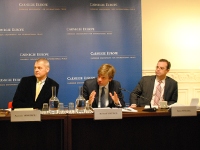Registration
Thank you!
You will receive an email confirming your registration.
IMGXYZ2818IMGZYXIn an event jointly hosted by Carnegie Europe and FRIDE, Richard Youngs, director general of FRIDE, presented the findings of his new book, Europe's decline and fall: The struggle against global irrelevance. He was joined by a panel of experts, including Financial Times Brussels bureau chief Peter Spiegel and Antonio Missiroli, head of the European Dialogue section at the Bureau of European Policy Advisers at the European Commission. The discussion was moderated by Carnegie’s Olga Shumylo-Tapiola.
Declining European Influence
- Relative Decline: The international influence wielded by Europe in the twenty-first century has been undermined by recent political and economic challenges. Talk of Europe’s relative decline is at the forefront of all policy debate in Europe. Youngs argued it is imperative that Europeans stop simply noting this decline and move to a serious and systematic discussion of how best to respond to it.
- Human Rights and Democracy Promotion: In many areas of foreign policy, the EU is drifting toward less liberal policies, Youngs said. The positions the EU takes in international affairs are increasingly introspective, defensive, and arguably more realist. This is particularly true of human rights and democracy promotion, where Youngs argued that the union’s commitment and support has weakened. The EU has decreased pressure for democratic reform in its immediate neighborhood as well as abroad and the union’s funding for projects on human rights and democracy remains very limited. Youngs suggested that this diminished attention to human rights and democratic reform comes at a time when international need for European support in this arena is growing.
- Post-Western World: In a post-Western world, Europe’s more realist foreign policy is to some extent justified, Youngs said. Europe must strike a careful balance, and not let this drift towards realism go to far; effectively navigating a more multi-polar world requires European policies that are both outward-looking and internationalist.
- Internal Focus: Youngs argued that the political capital invested in organizing the structure of the EU’s institutions has distracted its policy makers from engaging in the substantive debates that need to take place on Europe’s role in a changing world order:
- External Action Service: Spiegel agreed with Youngs, stating that the focus on the structure of the new External Action Service (EEAS), the EU’s new foreign ministry and diplomatic corps, has taken over European debates on foreign policy.
- A Single Voice: The institutional focus on having a unified pan-European voice on foreign policy is itself misplaced, Spiegel concluded. There are too many issues on which European nations are irreconcilably divided. Missiroli agreed, explaining that even on issues where European nations can broadly agree on the ultimate goals, disagreement often exists on the best policy course to obtain these goals.
- Normative Power: The general perception that Europe’s greatest source of global strength is its ability to export its successful regulations, processes, and standards holds too much sway, Youngs said. Evidence suggests that even on the EU’s immediate periphery, this approach is struggling to gain traction.
- Changing International System: The current international system was essentially created by Western powers, without the participation or input of new and powerful emerging nations. These nations question the legitimacy of the current system, Missiroli said. Ultimately, a different international system that has a stronger role for emerging powers will become necessary. Such changes in the construction of international institutions will affect the role of the EU.
Possible Prescriptions
- Focus on Eurozone Reforms: The future of Europe depends primarily on enforcing reforms to the structure of the Eurozone and modernizing European economies, Missiroli stated. This underlies any further European integration, as well as the EU’s ability to influence the world stage. Emerging nations owe their political success to their economic achievements. The big question for Europe is whether it can live up to the economic challenges of the twenty-first century.
- Revitalize EU Foreign Policy: If the EU can no longer rely on hard power to maintain its global influence, Spiegel stated, then it should look to other areas of strength to revitalize its foreign policy. A renewed emphasis on values promotion is one area where Europe can still serve as an example for the rest of the world. Equally, Europe’s colonial legacy gives it significant influence in certain parts of the world. It should look to leverage this influence as much as possible.
